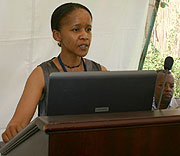Experts currently participating in the 59th meeting of the World Health Organization (WHO) summit have called for more intervention to prevent Mother to Child HIV Transmission (PMTCT).


Experts currently participating in the 59th meeting of the World Health Organization (WHO) summit have called for more intervention to prevent Mother to Child HIV Transmission (PMTCT).
Despite steady progress that African member countries of WHO have achieved in HIV prevention, more emphasis should be put to lower the infection rates.
While addressing members of the Great Lakes Initiative on AIDS (GLIA) and Abbott Laboratories, an HIV researcher from the University of Witswatersrand and ANOVA health institute based in South Africa, Coceka Nandipha Mnyani urged officials to promote the best practices of PMTCT.
According to Nandipha, although sub-Saharan Africa is faced with major challenges such as high rates of unplanned and unwanted pregnancies, emphasis is still required to curb transmission through breast feeding.
"There are recognized PMTCT strategies such as single dose nevirapine, short course zidovudine and use of Highly Active Antiretroviral Therapy (HAART) in nursing HIV-infected women which reduces disease transmission to infants.
"With the available infection statistics, it is however vital for countries to translate science into practice to reduce the alarming over 90 percent prevalence of children living with HIV,” Nandipha noted.
The acting Director of the HIV/AIDS and Sexually Transmitted Infections unit in TRAC plus, Jules Mugabo, also noted that Rwanda has consolidated its implementation of the PMTCT services nationwide.
"Apparently the services have been expanded countrywide including introduction of early infant diagnostics. HIV prevalence in exposed infants has dropped from 23.4 in 2004 to 6.9 in 2008,” Mugabo said.
The 2008 statistics from the Joint United Nations Programme on HIV/AIDS show that about 370,000 children under 15 get infected annually with the pandemic.
Ends


